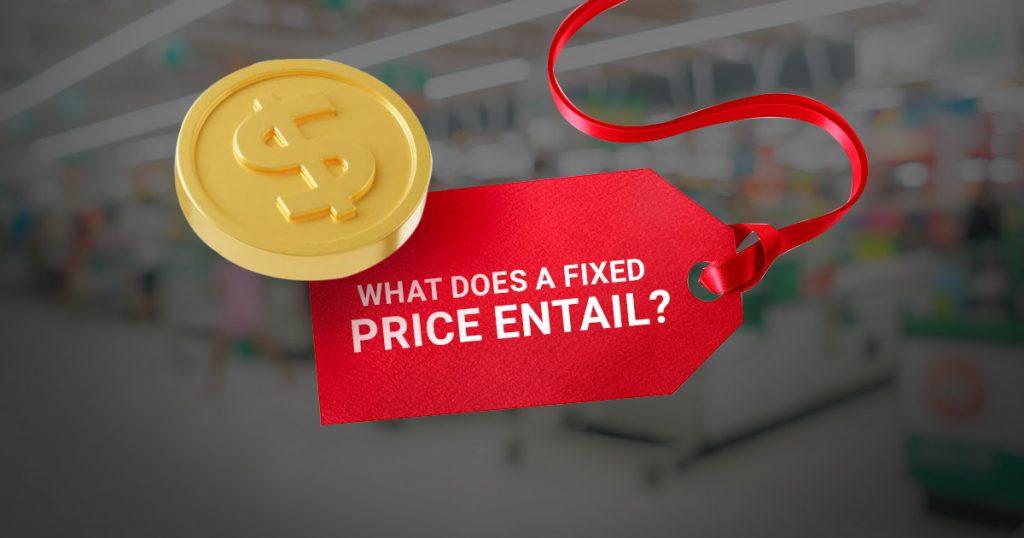In finance and business, the term “fixed price” is important. It means that the price of a product or service stays the same, no matter how the market changes or what happens around it. To have a clear understanding of fixed pricing and why it matters today, you need to know what fixed price means, how it works, and where it’s used.
What is a Fixed Price?
The fixed price meaning is straightforward: it’s a price that does not change over time. Whether it’s for a product or service, the price remains the same regardless of any market changes, production costs, or how much time it takes to complete the work.
For example, if you hire a contractor to build a house and agree on a fixed price, you will pay that amount, no matter how long the project takes or if material costs go up. The price is locked in from the beginning.
Here are the characteristics of fixed pricing:
- The main feature of fixed pricing is that the price stays the same once it’s set.
- Fixed prices make it easier for buyers to budget because they know exactly what they’ll pay.
- For sellers, fixed pricing helps manage the risk of changing costs. Even if market prices drop, they still get the agreed price.
Fixed Pricing vs Dynamic Pricing
In contrast to fixed pricing, some businesses use dynamic pricing. With dynamic pricing, the price of a product or service can change depending on factors like demand, time of purchase, or availability.
For example, hotels or airlines often use dynamic pricing. The cost of a hotel room may go up during busy seasons or if few rooms are available. With fixed pricing, you won’t experience these price fluctuations. You know the cost upfront and don’t have to worry about changes later on.
Benefits of Fixed Pricing
Predictability
A big advantage of a fixed price policy is predictability. When you buy something at a fixed price, you know exactly how much you’ll pay, with no surprise costs. This is useful for both consumers and businesses when budgeting.
Transparency
Fixed pricing brings transparency. When the price is agreed upon, you know exactly what you’ll owe, with no hidden fees or extra charges. Whether you’re buying a product or paying for a service, a fixed price keeps things clear and straightforward.
Reduced Risk
Fixed pricing helps reduce risk for businesses. If you’re offering a service at a fixed price, you can plan how much you’ll earn. For customers, it guarantees that the price will not change, even if the project faces delays or extra costs.
Disadvantages of Fixed Pricing
Lack of Flexibility
A drawback of fixed pricing is that it’s not flexible. If something unexpected happens, like a rise in material costs, the price cannot be changed. This can be a challenge for businesses that deal with fluctuating costs.
Potential for Overpricing
Sometimes, businesses may set a fixed price higher than necessary to cover costs. Since the price can’t be adjusted later, they might charge more upfront to avoid the risk of losing money. This can make fixed pricing seem more expensive compared to other pricing models.
Limited Room for Negotiation
With fixed pricing, there’s no room to negotiate. If you’re someone who enjoys negotiating, you might prefer a more flexible pricing system where you can try to get a better deal. In fixed pricing, the price is set, and it doesn’t change.
Where is Fixed Price Used?
You’ll find fixed pricing in many different industries. Here are some common examples where fixed prices are used:
Retail
In both online and physical stores, fixed prices are common. When you buy something in a store, the price is already set, and it won’t change at checkout. Whether you’re buying clothes, electronics, or groceries, the price remains the same.
In online stores, the fixed price is displayed clearly, so you know exactly how much you’ll pay before checking out. Fixed pricing makes the shopping process easier since customers don’t have to worry about price changes.
Construction and Contracting
In the construction industry, contractors often offer fixed pricing for projects. This means the cost of building a house, fixing a roof, or remodeling a kitchen is set from the start. Even if the job takes longer or material prices rise, the price won’t change for the customer.
For example, a plumber may offer a fixed price to repair a leak, so you know how much you’ll pay, regardless of how long the work takes.
Service Industry
Many service-based businesses use fixed pricing, such as haircuts, legal advice, or digital marketing. A lawyer, for example, may charge a fixed price to write a will or create a business contract. This makes it easy for customers to know exactly what they’ll pay for the service.
Subscriptions
Subscription services, like Netflix or software-as-a-service (SaaS) products, often use fixed pricing. You know exactly what you’ll pay each month or year, and that price doesn’t change unless the company decides to increase it.
For instance, you might pay a fixed price every month for your Netflix subscription, with no additional fees based on how many shows you watch.
When Fixed Pricing Fits Your Needs
Fixed pricing offers stability and certainty, making it a great choice when you need to know exactly what you’ll pay. However, it can be less flexible in markets where costs change often. The key takeaway is that fixed pricing works well when both buyers and sellers benefit from a clear, upfront cost, but businesses should weigh the pros and cons, especially in fast-changing industries.
